Evaluating Support Systems for Specific Needs in Health & Social Care
VerifiedAdded on 2024/05/21
|22
|4126
|90
Report
AI Summary
This assignment provides an understanding of the diverse needs of individuals requiring health and social care services, focusing on the case study of Mr. Simon Pen, who suffers from Parkinson’s disease. It analyzes the concepts of health, disability, illness, and behavior, assessing how perceptions about specific needs have changed over time. The report also examines the impact of past and present legislation, social policies, society, and culture on the availability of services for individuals like Mr. Pen and his family, highlighting acts such as the Carers (Equal Opportunities) Act 2004, Equality Act 2010, and Mental Health Act 2007. Furthermore, it explores the care needs of individuals with specific needs, emphasizing the importance of mental health and access to primary, acute, and community hospital services. The assignment also explains current support systems, including Clinical Commissioning Groups (CCGs), National Health Services (NHS), and third-sector organizations, advocating for a person-centered approach to care.
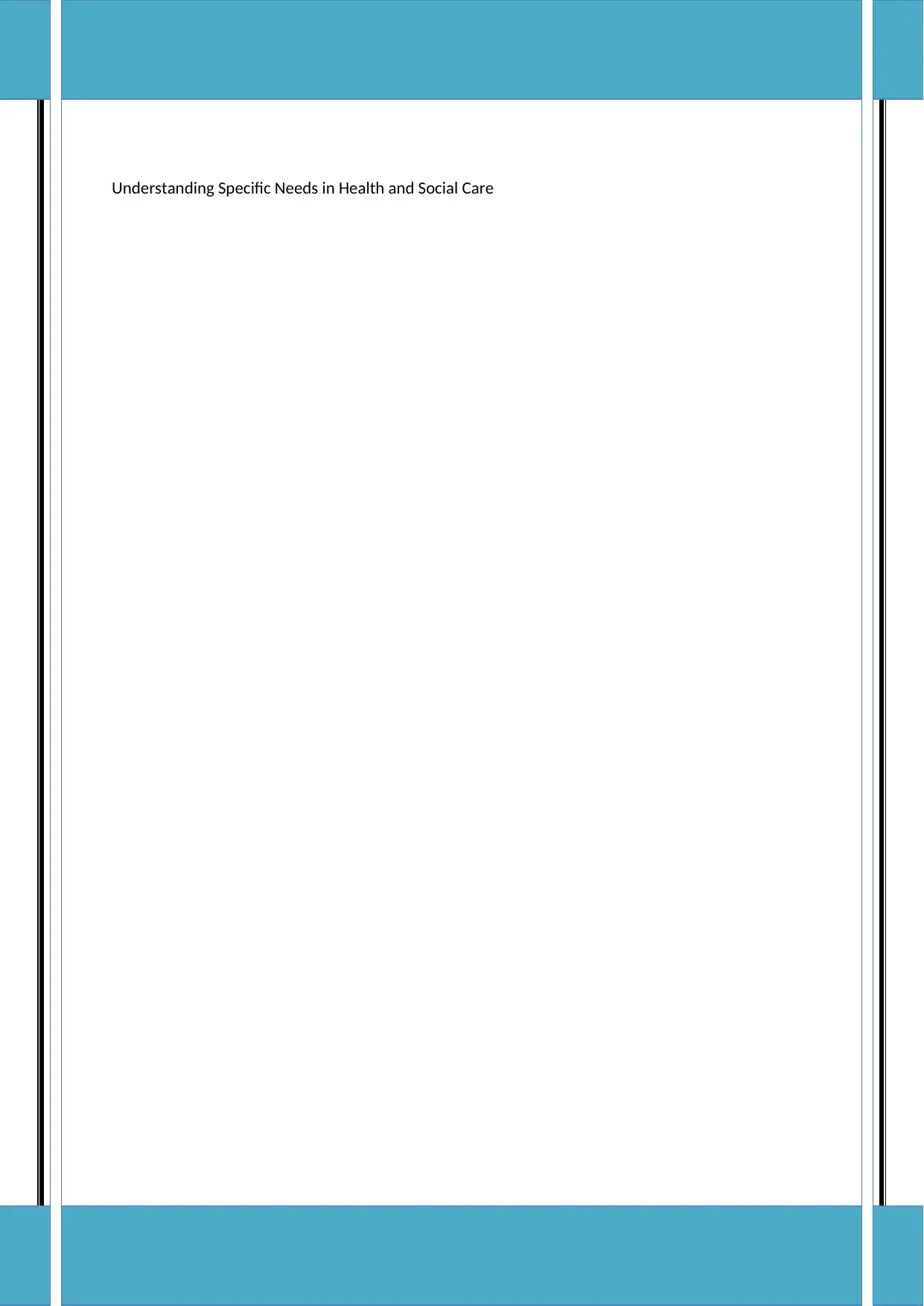
Understanding Specific Needs in Health and Social Care
Paraphrase This Document
Need a fresh take? Get an instant paraphrase of this document with our AI Paraphraser
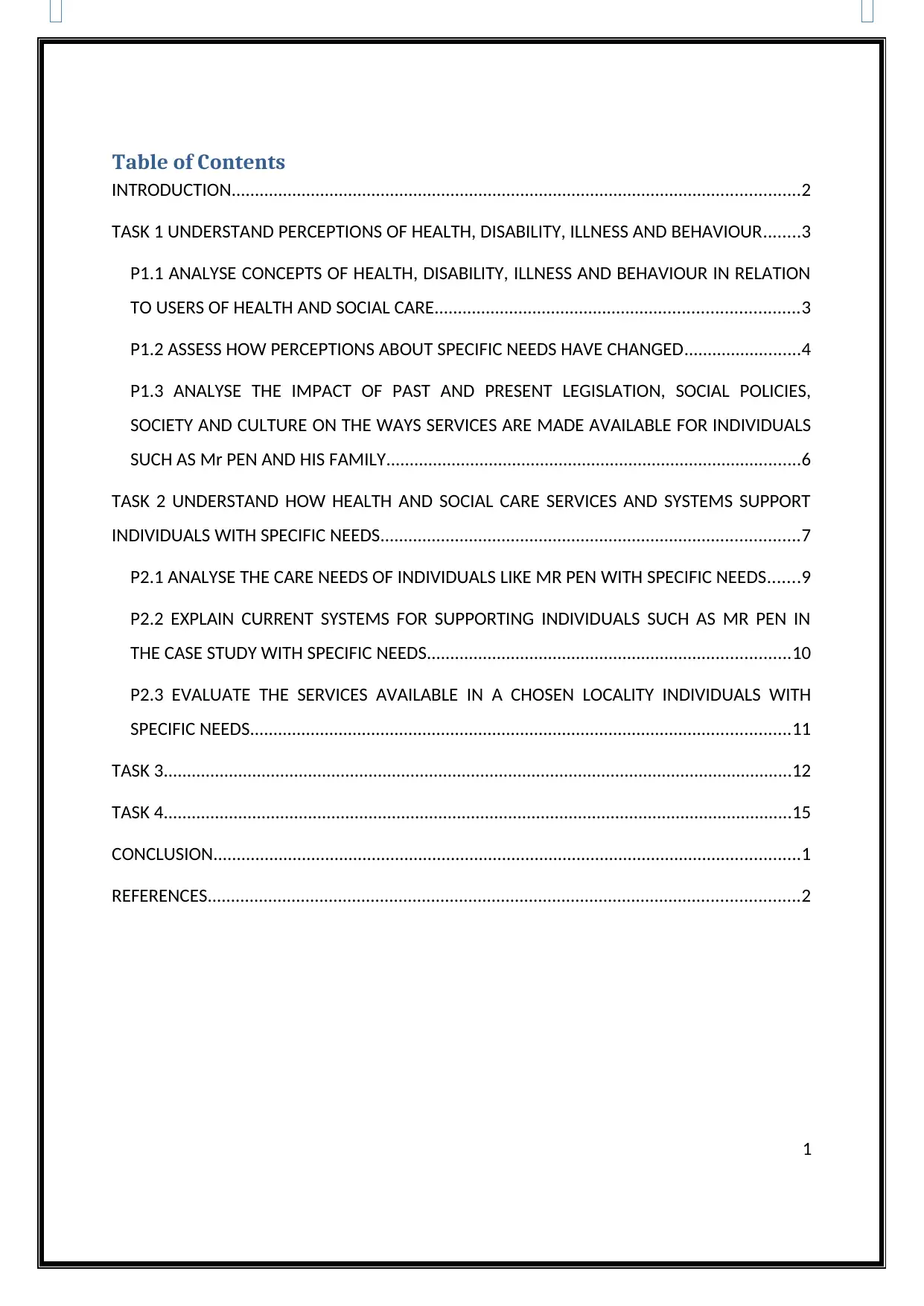
Table of Contents
INTRODUCTION..........................................................................................................................2
TASK 1 UNDERSTAND PERCEPTIONS OF HEALTH, DISABILITY, ILLNESS AND BEHAVIOUR........3
P1.1 ANALYSE CONCEPTS OF HEALTH, DISABILITY, ILLNESS AND BEHAVIOUR IN RELATION
TO USERS OF HEALTH AND SOCIAL CARE..............................................................................3
P1.2 ASSESS HOW PERCEPTIONS ABOUT SPECIFIC NEEDS HAVE CHANGED.........................4
P1.3 ANALYSE THE IMPACT OF PAST AND PRESENT LEGISLATION, SOCIAL POLICIES,
SOCIETY AND CULTURE ON THE WAYS SERVICES ARE MADE AVAILABLE FOR INDIVIDUALS
SUCH AS Mr PEN AND HIS FAMILY.........................................................................................6
TASK 2 UNDERSTAND HOW HEALTH AND SOCIAL CARE SERVICES AND SYSTEMS SUPPORT
INDIVIDUALS WITH SPECIFIC NEEDS..........................................................................................7
P2.1 ANALYSE THE CARE NEEDS OF INDIVIDUALS LIKE MR PEN WITH SPECIFIC NEEDS.......9
P2.2 EXPLAIN CURRENT SYSTEMS FOR SUPPORTING INDIVIDUALS SUCH AS MR PEN IN
THE CASE STUDY WITH SPECIFIC NEEDS..............................................................................10
P2.3 EVALUATE THE SERVICES AVAILABLE IN A CHOSEN LOCALITY INDIVIDUALS WITH
SPECIFIC NEEDS....................................................................................................................11
TASK 3.......................................................................................................................................12
TASK 4.......................................................................................................................................15
CONCLUSION..............................................................................................................................1
REFERENCES...............................................................................................................................2
1
INTRODUCTION..........................................................................................................................2
TASK 1 UNDERSTAND PERCEPTIONS OF HEALTH, DISABILITY, ILLNESS AND BEHAVIOUR........3
P1.1 ANALYSE CONCEPTS OF HEALTH, DISABILITY, ILLNESS AND BEHAVIOUR IN RELATION
TO USERS OF HEALTH AND SOCIAL CARE..............................................................................3
P1.2 ASSESS HOW PERCEPTIONS ABOUT SPECIFIC NEEDS HAVE CHANGED.........................4
P1.3 ANALYSE THE IMPACT OF PAST AND PRESENT LEGISLATION, SOCIAL POLICIES,
SOCIETY AND CULTURE ON THE WAYS SERVICES ARE MADE AVAILABLE FOR INDIVIDUALS
SUCH AS Mr PEN AND HIS FAMILY.........................................................................................6
TASK 2 UNDERSTAND HOW HEALTH AND SOCIAL CARE SERVICES AND SYSTEMS SUPPORT
INDIVIDUALS WITH SPECIFIC NEEDS..........................................................................................7
P2.1 ANALYSE THE CARE NEEDS OF INDIVIDUALS LIKE MR PEN WITH SPECIFIC NEEDS.......9
P2.2 EXPLAIN CURRENT SYSTEMS FOR SUPPORTING INDIVIDUALS SUCH AS MR PEN IN
THE CASE STUDY WITH SPECIFIC NEEDS..............................................................................10
P2.3 EVALUATE THE SERVICES AVAILABLE IN A CHOSEN LOCALITY INDIVIDUALS WITH
SPECIFIC NEEDS....................................................................................................................11
TASK 3.......................................................................................................................................12
TASK 4.......................................................................................................................................15
CONCLUSION..............................................................................................................................1
REFERENCES...............................................................................................................................2
1
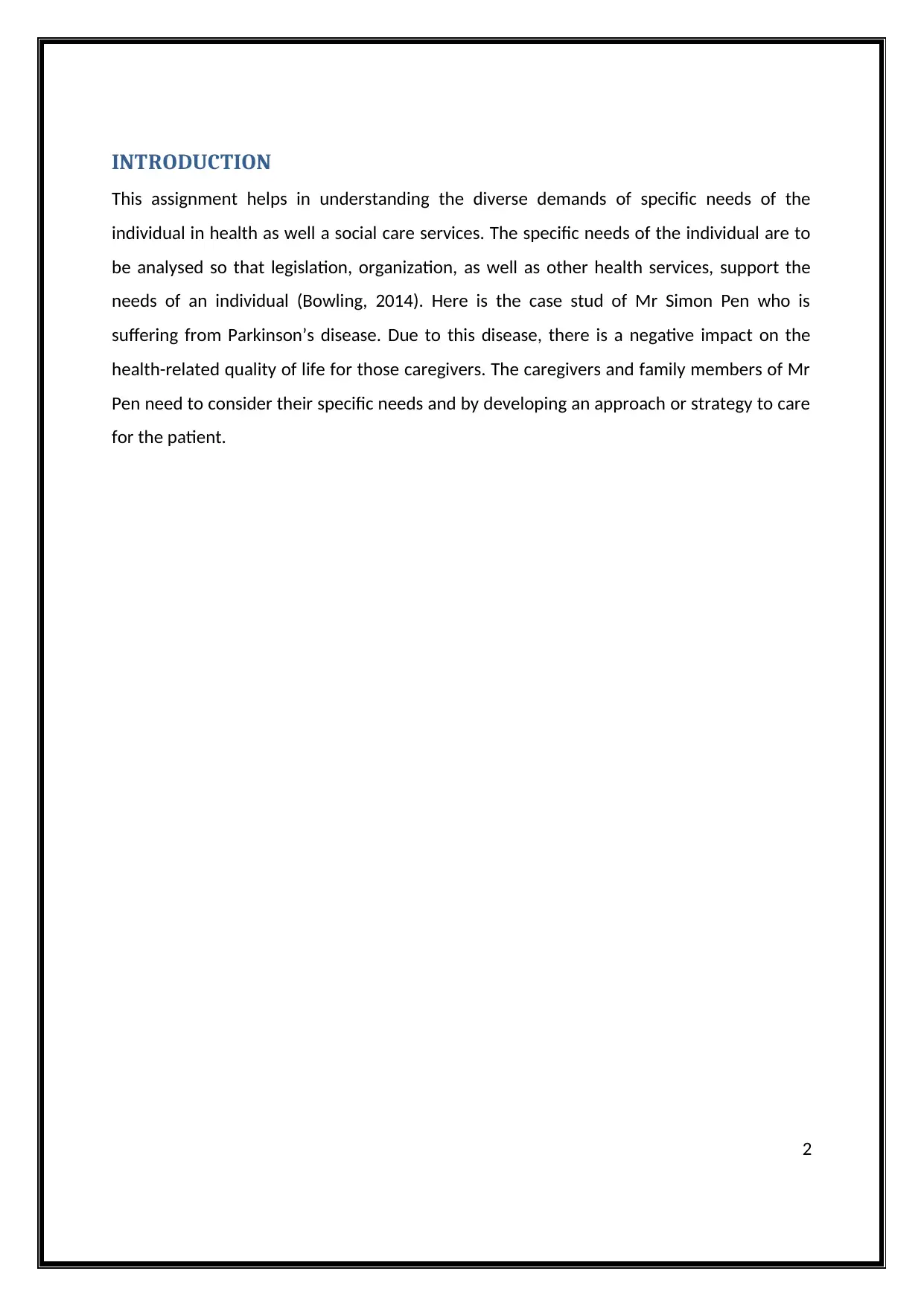
INTRODUCTION
This assignment helps in understanding the diverse demands of specific needs of the
individual in health as well a social care services. The specific needs of the individual are to
be analysed so that legislation, organization, as well as other health services, support the
needs of an individual (Bowling, 2014). Here is the case stud of Mr Simon Pen who is
suffering from Parkinson’s disease. Due to this disease, there is a negative impact on the
health-related quality of life for those caregivers. The caregivers and family members of Mr
Pen need to consider their specific needs and by developing an approach or strategy to care
for the patient.
2
This assignment helps in understanding the diverse demands of specific needs of the
individual in health as well a social care services. The specific needs of the individual are to
be analysed so that legislation, organization, as well as other health services, support the
needs of an individual (Bowling, 2014). Here is the case stud of Mr Simon Pen who is
suffering from Parkinson’s disease. Due to this disease, there is a negative impact on the
health-related quality of life for those caregivers. The caregivers and family members of Mr
Pen need to consider their specific needs and by developing an approach or strategy to care
for the patient.
2
⊘ This is a preview!⊘
Do you want full access?
Subscribe today to unlock all pages.

Trusted by 1+ million students worldwide
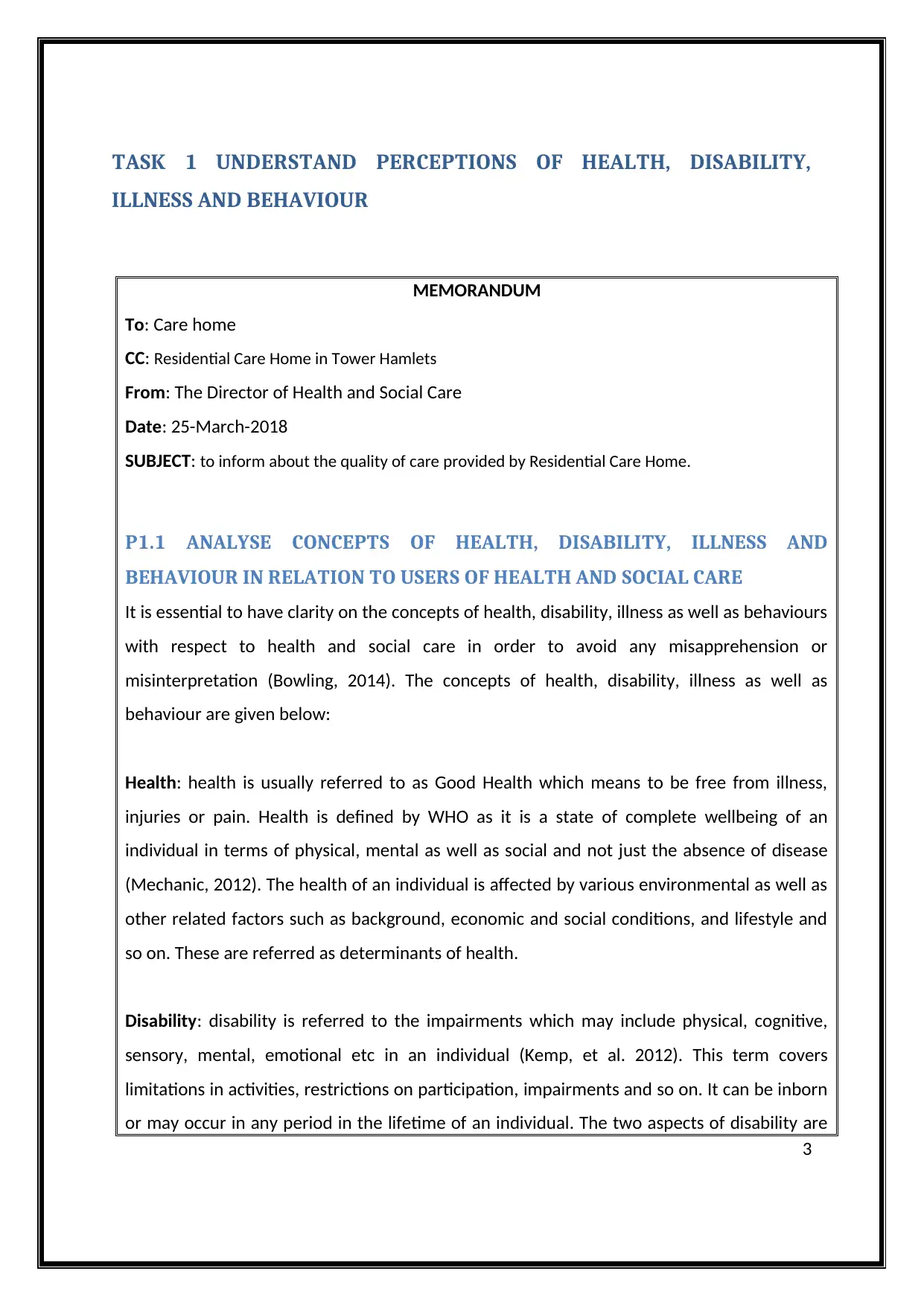
TASK 1 UNDERSTAND PERCEPTIONS OF HEALTH, DISABILITY,
ILLNESS AND BEHAVIOUR
MEMORANDUM
To: Care home
CC: Residential Care Home in Tower Hamlets
From: The Director of Health and Social Care
Date: 25-March-2018
SUBJECT: to inform about the quality of care provided by Residential Care Home.
P1.1 ANALYSE CONCEPTS OF HEALTH, DISABILITY, ILLNESS AND
BEHAVIOUR IN RELATION TO USERS OF HEALTH AND SOCIAL CARE
It is essential to have clarity on the concepts of health, disability, illness as well as behaviours
with respect to health and social care in order to avoid any misapprehension or
misinterpretation (Bowling, 2014). The concepts of health, disability, illness as well as
behaviour are given below:
Health: health is usually referred to as Good Health which means to be free from illness,
injuries or pain. Health is defined by WHO as it is a state of complete wellbeing of an
individual in terms of physical, mental as well as social and not just the absence of disease
(Mechanic, 2012). The health of an individual is affected by various environmental as well as
other related factors such as background, economic and social conditions, and lifestyle and
so on. These are referred as determinants of health.
Disability: disability is referred to the impairments which may include physical, cognitive,
sensory, mental, emotional etc in an individual (Kemp, et al. 2012). This term covers
limitations in activities, restrictions on participation, impairments and so on. It can be inborn
or may occur in any period in the lifetime of an individual. The two aspects of disability are
3
ILLNESS AND BEHAVIOUR
MEMORANDUM
To: Care home
CC: Residential Care Home in Tower Hamlets
From: The Director of Health and Social Care
Date: 25-March-2018
SUBJECT: to inform about the quality of care provided by Residential Care Home.
P1.1 ANALYSE CONCEPTS OF HEALTH, DISABILITY, ILLNESS AND
BEHAVIOUR IN RELATION TO USERS OF HEALTH AND SOCIAL CARE
It is essential to have clarity on the concepts of health, disability, illness as well as behaviours
with respect to health and social care in order to avoid any misapprehension or
misinterpretation (Bowling, 2014). The concepts of health, disability, illness as well as
behaviour are given below:
Health: health is usually referred to as Good Health which means to be free from illness,
injuries or pain. Health is defined by WHO as it is a state of complete wellbeing of an
individual in terms of physical, mental as well as social and not just the absence of disease
(Mechanic, 2012). The health of an individual is affected by various environmental as well as
other related factors such as background, economic and social conditions, and lifestyle and
so on. These are referred as determinants of health.
Disability: disability is referred to the impairments which may include physical, cognitive,
sensory, mental, emotional etc in an individual (Kemp, et al. 2012). This term covers
limitations in activities, restrictions on participation, impairments and so on. It can be inborn
or may occur in any period in the lifetime of an individual. The two aspects of disability are
3
Paraphrase This Document
Need a fresh take? Get an instant paraphrase of this document with our AI Paraphraser
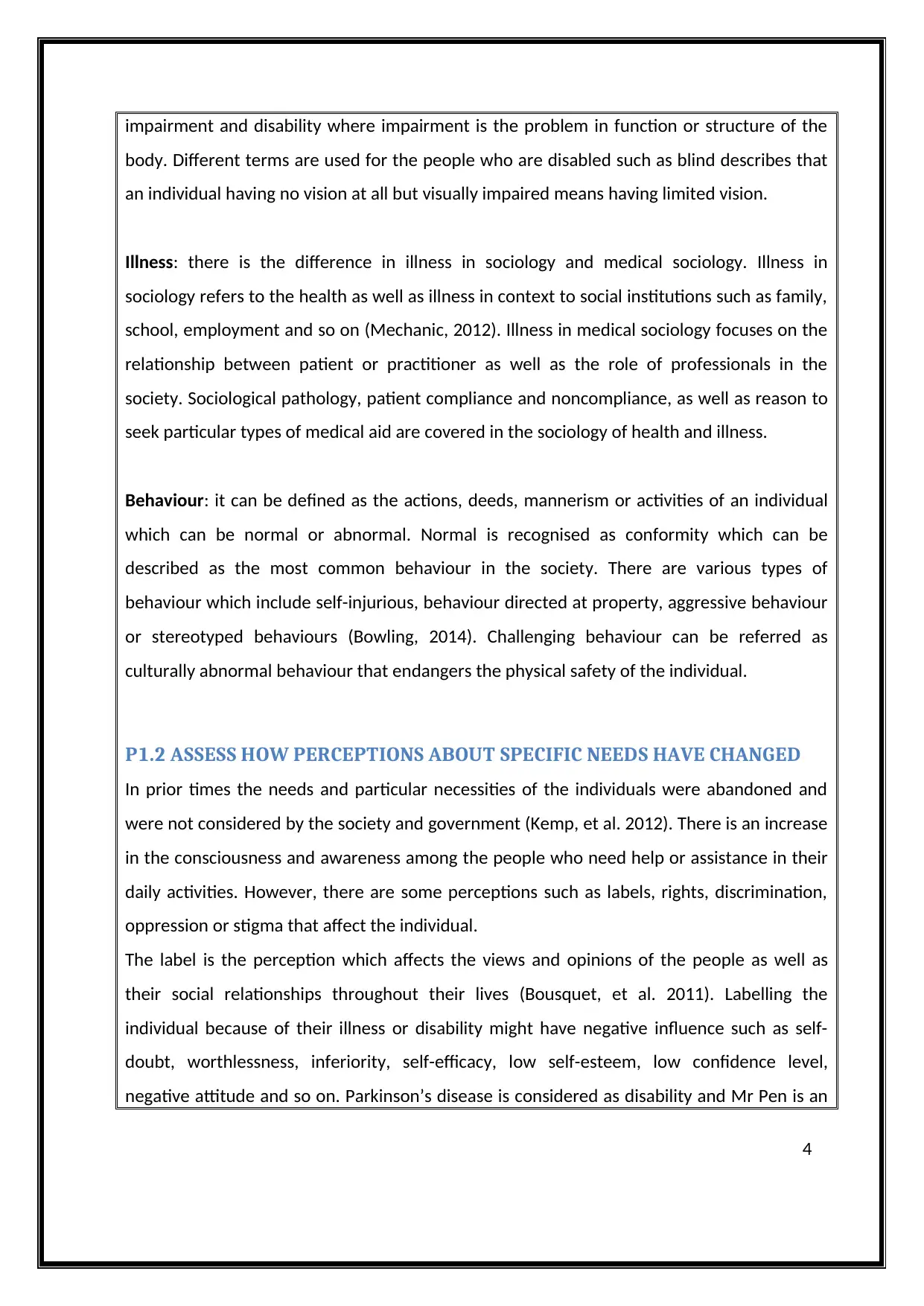
impairment and disability where impairment is the problem in function or structure of the
body. Different terms are used for the people who are disabled such as blind describes that
an individual having no vision at all but visually impaired means having limited vision.
Illness: there is the difference in illness in sociology and medical sociology. Illness in
sociology refers to the health as well as illness in context to social institutions such as family,
school, employment and so on (Mechanic, 2012). Illness in medical sociology focuses on the
relationship between patient or practitioner as well as the role of professionals in the
society. Sociological pathology, patient compliance and noncompliance, as well as reason to
seek particular types of medical aid are covered in the sociology of health and illness.
Behaviour: it can be defined as the actions, deeds, mannerism or activities of an individual
which can be normal or abnormal. Normal is recognised as conformity which can be
described as the most common behaviour in the society. There are various types of
behaviour which include self-injurious, behaviour directed at property, aggressive behaviour
or stereotyped behaviours (Bowling, 2014). Challenging behaviour can be referred as
culturally abnormal behaviour that endangers the physical safety of the individual.
P1.2 ASSESS HOW PERCEPTIONS ABOUT SPECIFIC NEEDS HAVE CHANGED
In prior times the needs and particular necessities of the individuals were abandoned and
were not considered by the society and government (Kemp, et al. 2012). There is an increase
in the consciousness and awareness among the people who need help or assistance in their
daily activities. However, there are some perceptions such as labels, rights, discrimination,
oppression or stigma that affect the individual.
The label is the perception which affects the views and opinions of the people as well as
their social relationships throughout their lives (Bousquet, et al. 2011). Labelling the
individual because of their illness or disability might have negative influence such as self-
doubt, worthlessness, inferiority, self-efficacy, low self-esteem, low confidence level,
negative attitude and so on. Parkinson’s disease is considered as disability and Mr Pen is an
4
body. Different terms are used for the people who are disabled such as blind describes that
an individual having no vision at all but visually impaired means having limited vision.
Illness: there is the difference in illness in sociology and medical sociology. Illness in
sociology refers to the health as well as illness in context to social institutions such as family,
school, employment and so on (Mechanic, 2012). Illness in medical sociology focuses on the
relationship between patient or practitioner as well as the role of professionals in the
society. Sociological pathology, patient compliance and noncompliance, as well as reason to
seek particular types of medical aid are covered in the sociology of health and illness.
Behaviour: it can be defined as the actions, deeds, mannerism or activities of an individual
which can be normal or abnormal. Normal is recognised as conformity which can be
described as the most common behaviour in the society. There are various types of
behaviour which include self-injurious, behaviour directed at property, aggressive behaviour
or stereotyped behaviours (Bowling, 2014). Challenging behaviour can be referred as
culturally abnormal behaviour that endangers the physical safety of the individual.
P1.2 ASSESS HOW PERCEPTIONS ABOUT SPECIFIC NEEDS HAVE CHANGED
In prior times the needs and particular necessities of the individuals were abandoned and
were not considered by the society and government (Kemp, et al. 2012). There is an increase
in the consciousness and awareness among the people who need help or assistance in their
daily activities. However, there are some perceptions such as labels, rights, discrimination,
oppression or stigma that affect the individual.
The label is the perception which affects the views and opinions of the people as well as
their social relationships throughout their lives (Bousquet, et al. 2011). Labelling the
individual because of their illness or disability might have negative influence such as self-
doubt, worthlessness, inferiority, self-efficacy, low self-esteem, low confidence level,
negative attitude and so on. Parkinson’s disease is considered as disability and Mr Pen is an
4
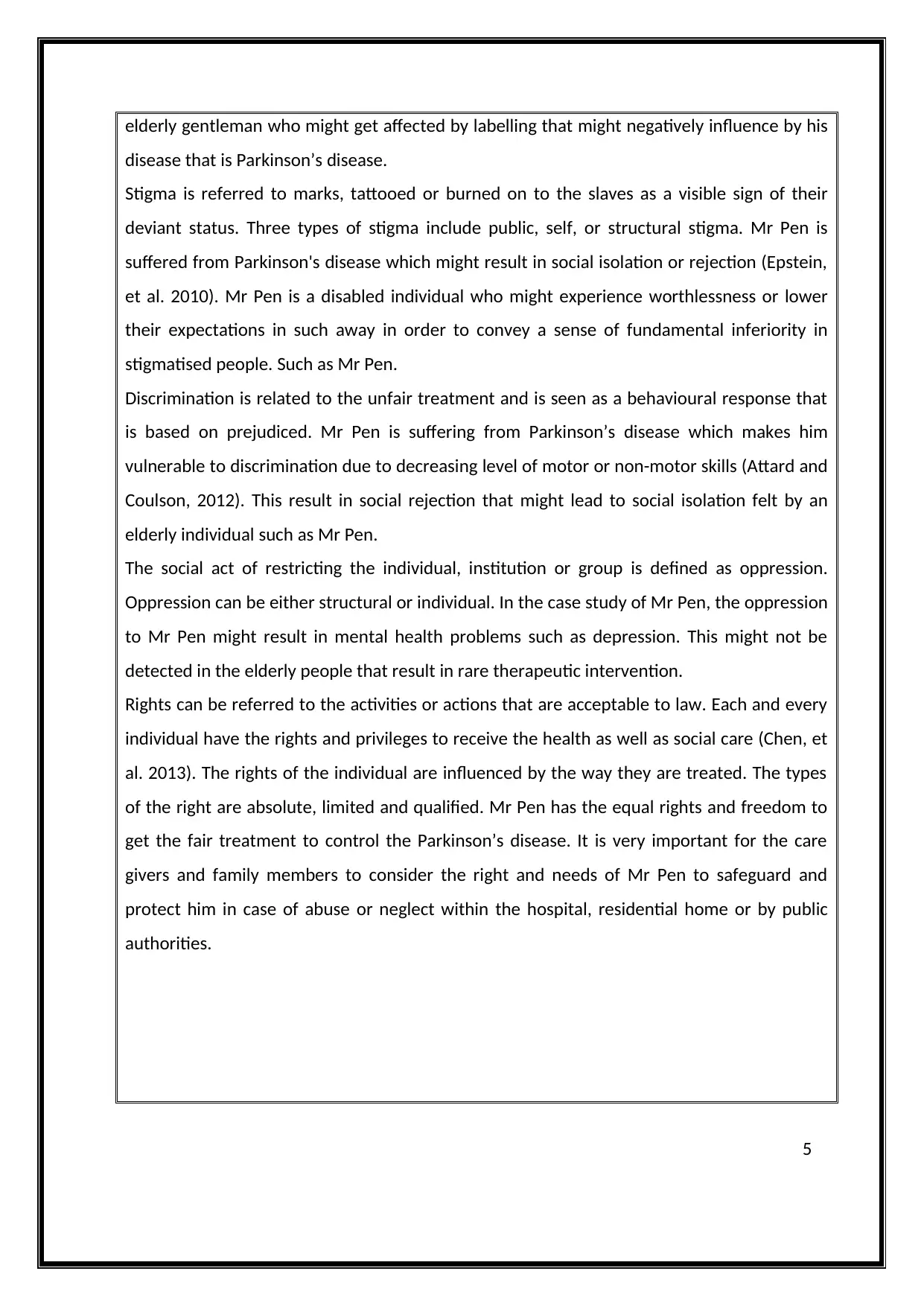
elderly gentleman who might get affected by labelling that might negatively influence by his
disease that is Parkinson’s disease.
Stigma is referred to marks, tattooed or burned on to the slaves as a visible sign of their
deviant status. Three types of stigma include public, self, or structural stigma. Mr Pen is
suffered from Parkinson's disease which might result in social isolation or rejection (Epstein,
et al. 2010). Mr Pen is a disabled individual who might experience worthlessness or lower
their expectations in such away in order to convey a sense of fundamental inferiority in
stigmatised people. Such as Mr Pen.
Discrimination is related to the unfair treatment and is seen as a behavioural response that
is based on prejudiced. Mr Pen is suffering from Parkinson’s disease which makes him
vulnerable to discrimination due to decreasing level of motor or non-motor skills (Attard and
Coulson, 2012). This result in social rejection that might lead to social isolation felt by an
elderly individual such as Mr Pen.
The social act of restricting the individual, institution or group is defined as oppression.
Oppression can be either structural or individual. In the case study of Mr Pen, the oppression
to Mr Pen might result in mental health problems such as depression. This might not be
detected in the elderly people that result in rare therapeutic intervention.
Rights can be referred to the activities or actions that are acceptable to law. Each and every
individual have the rights and privileges to receive the health as well as social care (Chen, et
al. 2013). The rights of the individual are influenced by the way they are treated. The types
of the right are absolute, limited and qualified. Mr Pen has the equal rights and freedom to
get the fair treatment to control the Parkinson’s disease. It is very important for the care
givers and family members to consider the right and needs of Mr Pen to safeguard and
protect him in case of abuse or neglect within the hospital, residential home or by public
authorities.
5
disease that is Parkinson’s disease.
Stigma is referred to marks, tattooed or burned on to the slaves as a visible sign of their
deviant status. Three types of stigma include public, self, or structural stigma. Mr Pen is
suffered from Parkinson's disease which might result in social isolation or rejection (Epstein,
et al. 2010). Mr Pen is a disabled individual who might experience worthlessness or lower
their expectations in such away in order to convey a sense of fundamental inferiority in
stigmatised people. Such as Mr Pen.
Discrimination is related to the unfair treatment and is seen as a behavioural response that
is based on prejudiced. Mr Pen is suffering from Parkinson’s disease which makes him
vulnerable to discrimination due to decreasing level of motor or non-motor skills (Attard and
Coulson, 2012). This result in social rejection that might lead to social isolation felt by an
elderly individual such as Mr Pen.
The social act of restricting the individual, institution or group is defined as oppression.
Oppression can be either structural or individual. In the case study of Mr Pen, the oppression
to Mr Pen might result in mental health problems such as depression. This might not be
detected in the elderly people that result in rare therapeutic intervention.
Rights can be referred to the activities or actions that are acceptable to law. Each and every
individual have the rights and privileges to receive the health as well as social care (Chen, et
al. 2013). The rights of the individual are influenced by the way they are treated. The types
of the right are absolute, limited and qualified. Mr Pen has the equal rights and freedom to
get the fair treatment to control the Parkinson’s disease. It is very important for the care
givers and family members to consider the right and needs of Mr Pen to safeguard and
protect him in case of abuse or neglect within the hospital, residential home or by public
authorities.
5
⊘ This is a preview!⊘
Do you want full access?
Subscribe today to unlock all pages.

Trusted by 1+ million students worldwide
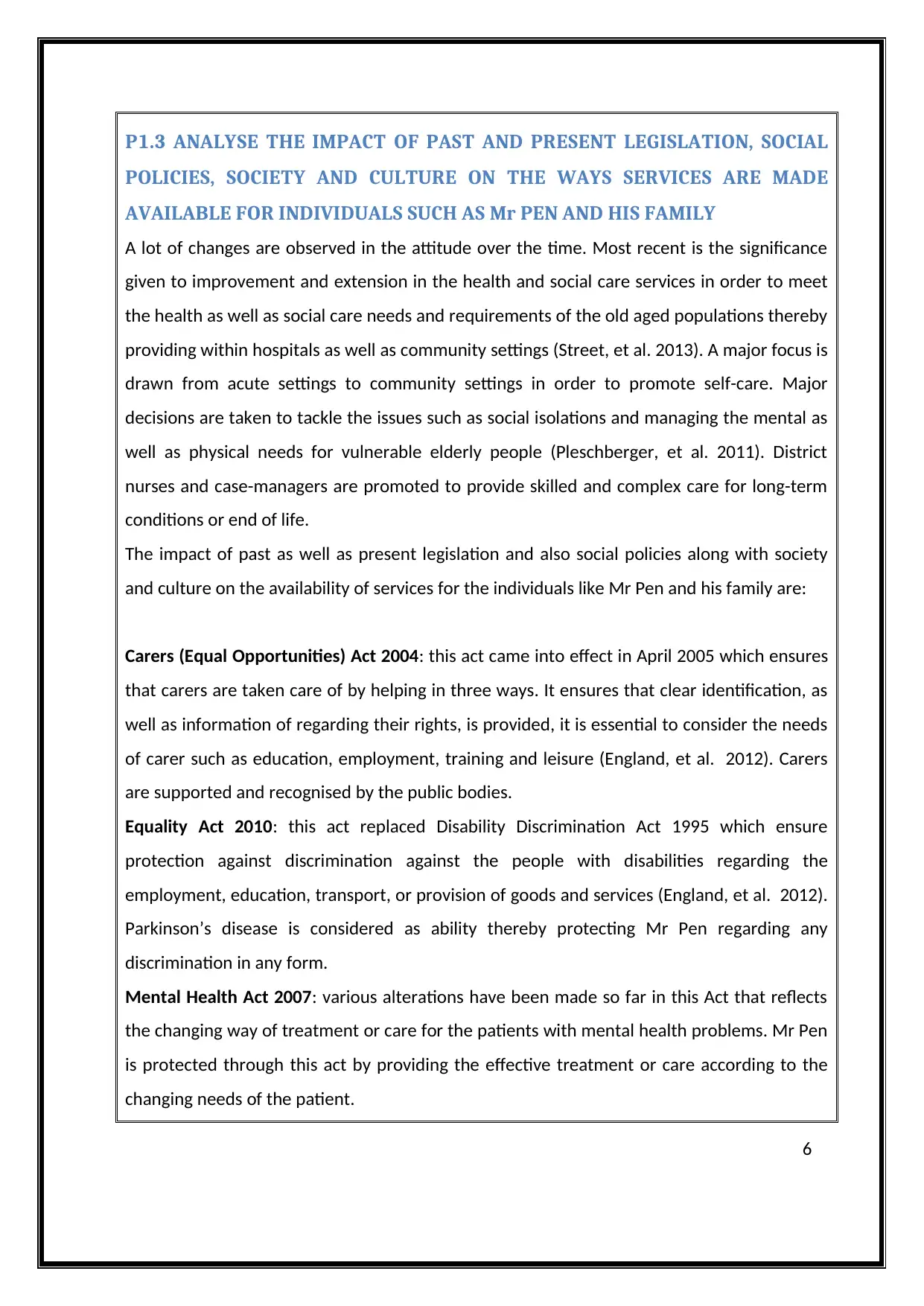
P1.3 ANALYSE THE IMPACT OF PAST AND PRESENT LEGISLATION, SOCIAL
POLICIES, SOCIETY AND CULTURE ON THE WAYS SERVICES ARE MADE
AVAILABLE FOR INDIVIDUALS SUCH AS Mr PEN AND HIS FAMILY
A lot of changes are observed in the attitude over the time. Most recent is the significance
given to improvement and extension in the health and social care services in order to meet
the health as well as social care needs and requirements of the old aged populations thereby
providing within hospitals as well as community settings (Street, et al. 2013). A major focus is
drawn from acute settings to community settings in order to promote self-care. Major
decisions are taken to tackle the issues such as social isolations and managing the mental as
well as physical needs for vulnerable elderly people (Pleschberger, et al. 2011). District
nurses and case-managers are promoted to provide skilled and complex care for long-term
conditions or end of life.
The impact of past as well as present legislation and also social policies along with society
and culture on the availability of services for the individuals like Mr Pen and his family are:
Carers (Equal Opportunities) Act 2004: this act came into effect in April 2005 which ensures
that carers are taken care of by helping in three ways. It ensures that clear identification, as
well as information of regarding their rights, is provided, it is essential to consider the needs
of carer such as education, employment, training and leisure (England, et al. 2012). Carers
are supported and recognised by the public bodies.
Equality Act 2010: this act replaced Disability Discrimination Act 1995 which ensure
protection against discrimination against the people with disabilities regarding the
employment, education, transport, or provision of goods and services (England, et al. 2012).
Parkinson’s disease is considered as ability thereby protecting Mr Pen regarding any
discrimination in any form.
Mental Health Act 2007: various alterations have been made so far in this Act that reflects
the changing way of treatment or care for the patients with mental health problems. Mr Pen
is protected through this act by providing the effective treatment or care according to the
changing needs of the patient.
6
POLICIES, SOCIETY AND CULTURE ON THE WAYS SERVICES ARE MADE
AVAILABLE FOR INDIVIDUALS SUCH AS Mr PEN AND HIS FAMILY
A lot of changes are observed in the attitude over the time. Most recent is the significance
given to improvement and extension in the health and social care services in order to meet
the health as well as social care needs and requirements of the old aged populations thereby
providing within hospitals as well as community settings (Street, et al. 2013). A major focus is
drawn from acute settings to community settings in order to promote self-care. Major
decisions are taken to tackle the issues such as social isolations and managing the mental as
well as physical needs for vulnerable elderly people (Pleschberger, et al. 2011). District
nurses and case-managers are promoted to provide skilled and complex care for long-term
conditions or end of life.
The impact of past as well as present legislation and also social policies along with society
and culture on the availability of services for the individuals like Mr Pen and his family are:
Carers (Equal Opportunities) Act 2004: this act came into effect in April 2005 which ensures
that carers are taken care of by helping in three ways. It ensures that clear identification, as
well as information of regarding their rights, is provided, it is essential to consider the needs
of carer such as education, employment, training and leisure (England, et al. 2012). Carers
are supported and recognised by the public bodies.
Equality Act 2010: this act replaced Disability Discrimination Act 1995 which ensure
protection against discrimination against the people with disabilities regarding the
employment, education, transport, or provision of goods and services (England, et al. 2012).
Parkinson’s disease is considered as ability thereby protecting Mr Pen regarding any
discrimination in any form.
Mental Health Act 2007: various alterations have been made so far in this Act that reflects
the changing way of treatment or care for the patients with mental health problems. Mr Pen
is protected through this act by providing the effective treatment or care according to the
changing needs of the patient.
6
Paraphrase This Document
Need a fresh take? Get an instant paraphrase of this document with our AI Paraphraser
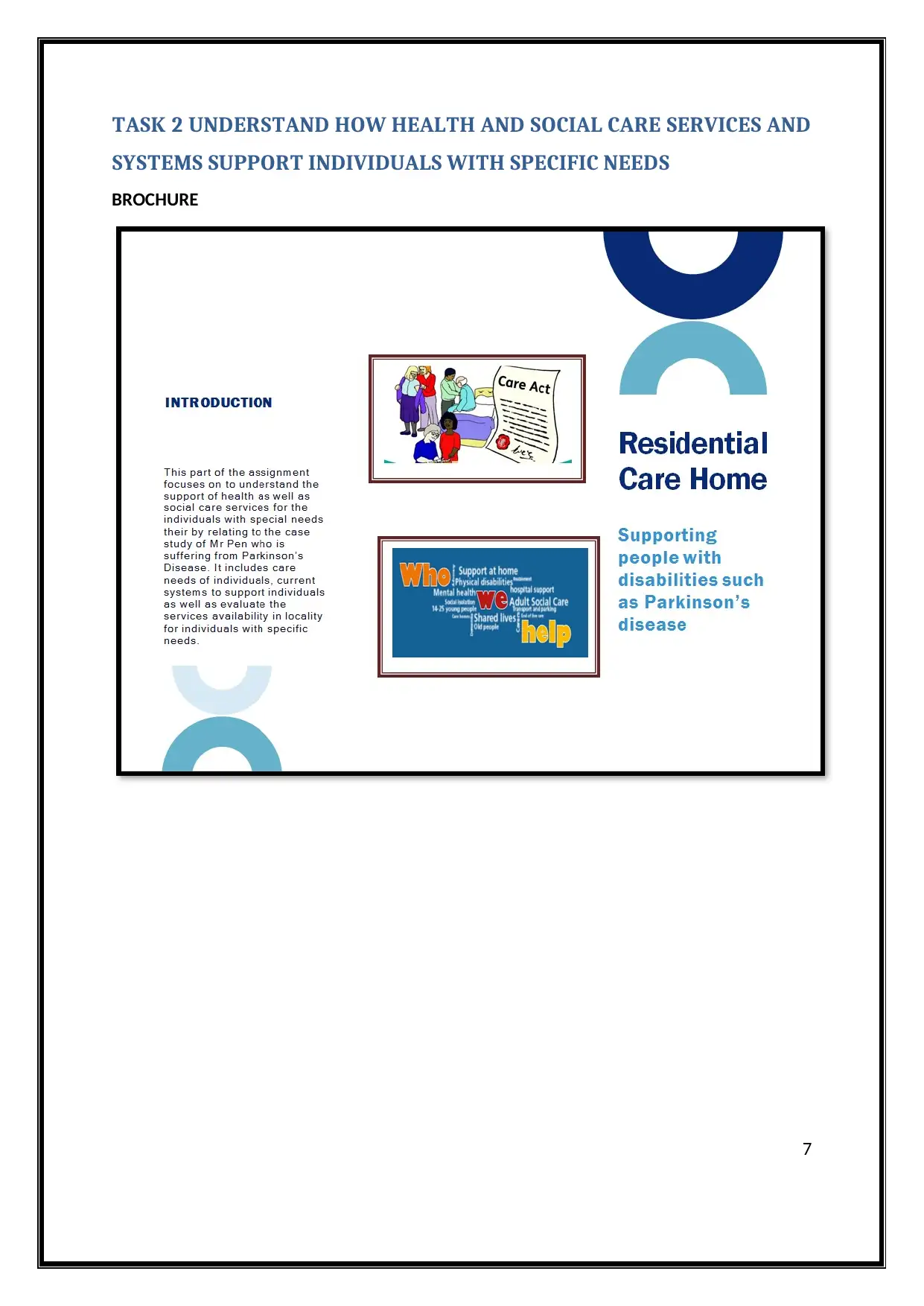
TASK 2 UNDERSTAND HOW HEALTH AND SOCIAL CARE SERVICES AND
SYSTEMS SUPPORT INDIVIDUALS WITH SPECIFIC NEEDS
BROCHURE
7
SYSTEMS SUPPORT INDIVIDUALS WITH SPECIFIC NEEDS
BROCHURE
7
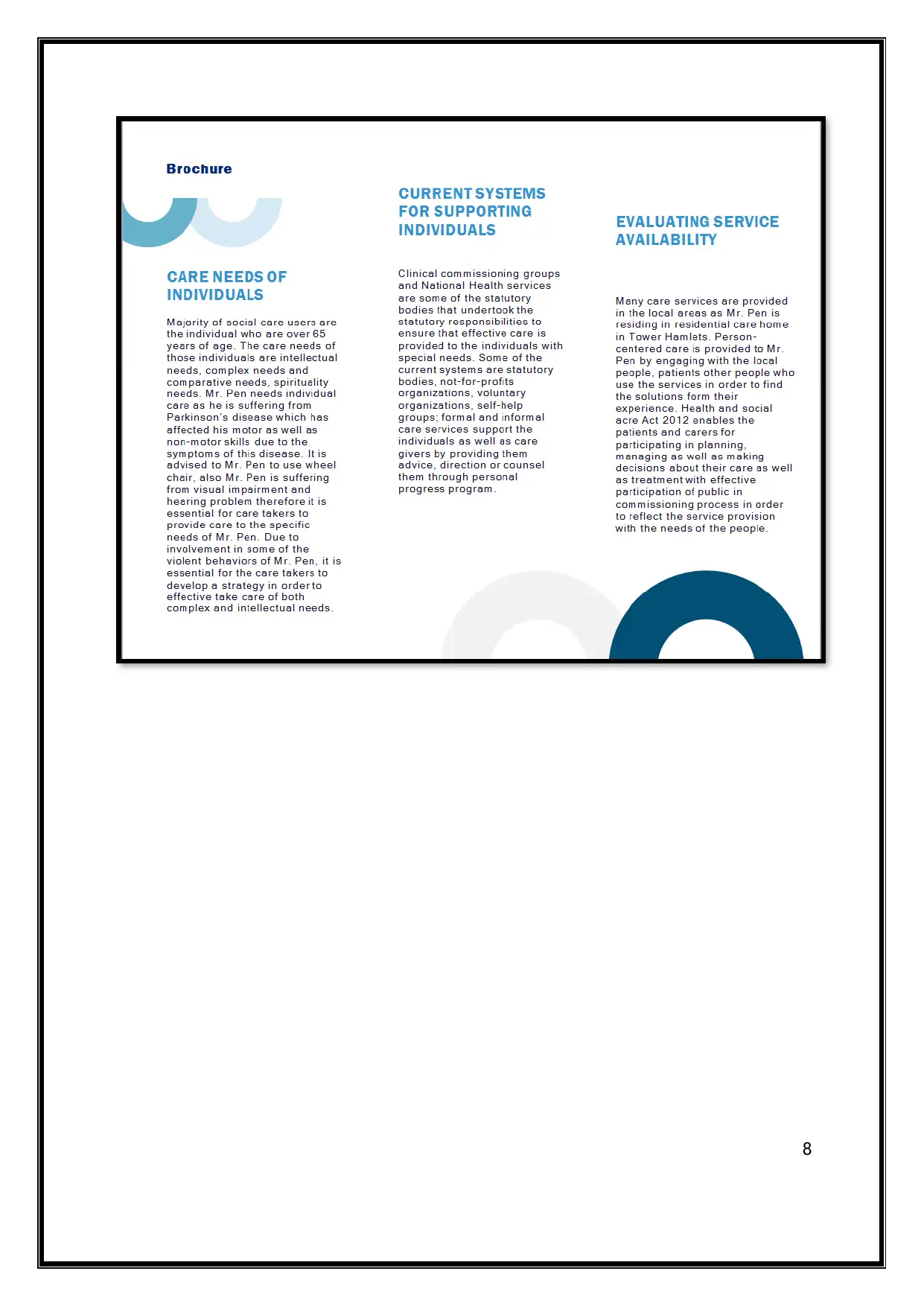
8
⊘ This is a preview!⊘
Do you want full access?
Subscribe today to unlock all pages.

Trusted by 1+ million students worldwide
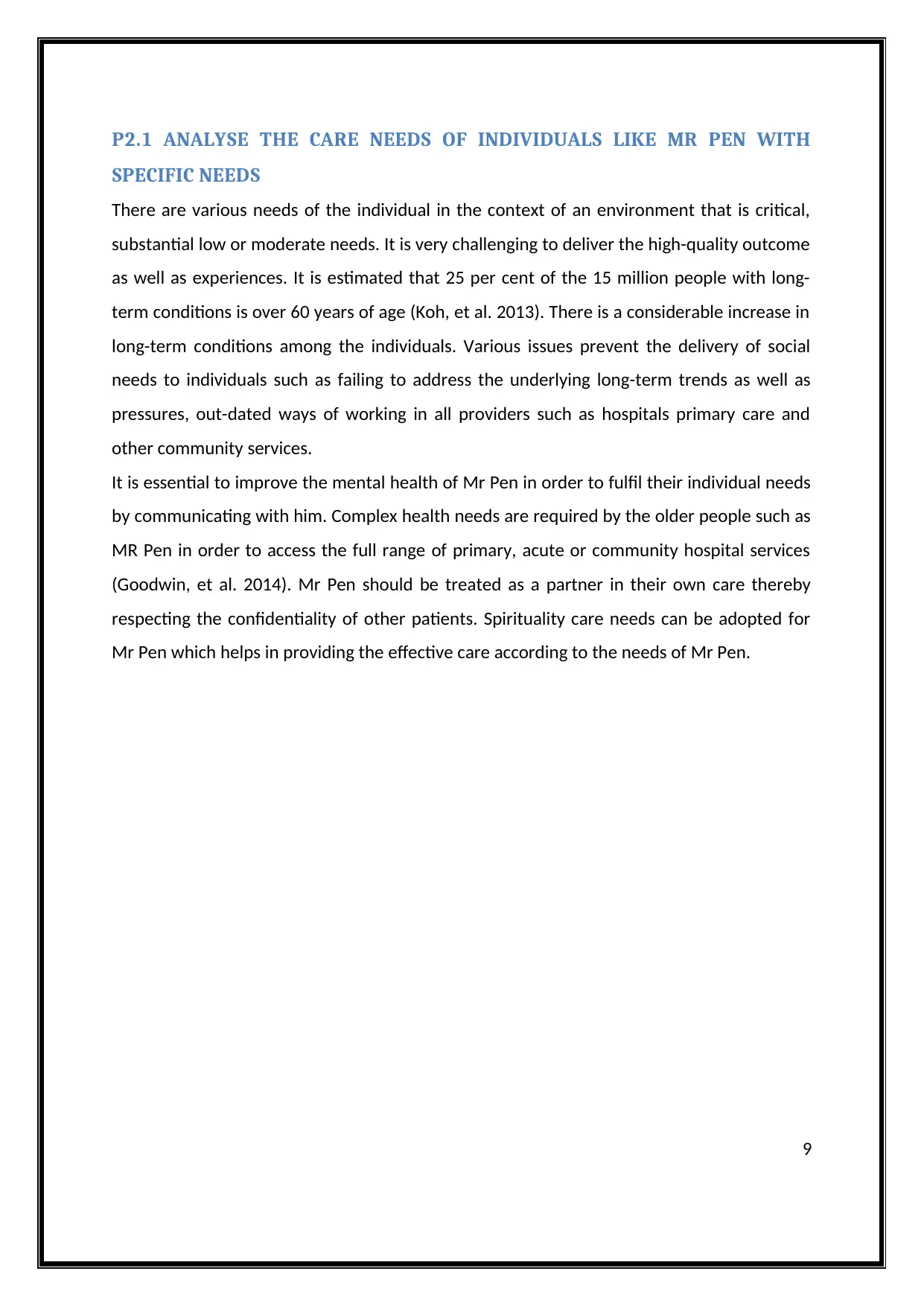
P2.1 ANALYSE THE CARE NEEDS OF INDIVIDUALS LIKE MR PEN WITH
SPECIFIC NEEDS
There are various needs of the individual in the context of an environment that is critical,
substantial low or moderate needs. It is very challenging to deliver the high-quality outcome
as well as experiences. It is estimated that 25 per cent of the 15 million people with long-
term conditions is over 60 years of age (Koh, et al. 2013). There is a considerable increase in
long-term conditions among the individuals. Various issues prevent the delivery of social
needs to individuals such as failing to address the underlying long-term trends as well as
pressures, out-dated ways of working in all providers such as hospitals primary care and
other community services.
It is essential to improve the mental health of Mr Pen in order to fulfil their individual needs
by communicating with him. Complex health needs are required by the older people such as
MR Pen in order to access the full range of primary, acute or community hospital services
(Goodwin, et al. 2014). Mr Pen should be treated as a partner in their own care thereby
respecting the confidentiality of other patients. Spirituality care needs can be adopted for
Mr Pen which helps in providing the effective care according to the needs of Mr Pen.
9
SPECIFIC NEEDS
There are various needs of the individual in the context of an environment that is critical,
substantial low or moderate needs. It is very challenging to deliver the high-quality outcome
as well as experiences. It is estimated that 25 per cent of the 15 million people with long-
term conditions is over 60 years of age (Koh, et al. 2013). There is a considerable increase in
long-term conditions among the individuals. Various issues prevent the delivery of social
needs to individuals such as failing to address the underlying long-term trends as well as
pressures, out-dated ways of working in all providers such as hospitals primary care and
other community services.
It is essential to improve the mental health of Mr Pen in order to fulfil their individual needs
by communicating with him. Complex health needs are required by the older people such as
MR Pen in order to access the full range of primary, acute or community hospital services
(Goodwin, et al. 2014). Mr Pen should be treated as a partner in their own care thereby
respecting the confidentiality of other patients. Spirituality care needs can be adopted for
Mr Pen which helps in providing the effective care according to the needs of Mr Pen.
9
Paraphrase This Document
Need a fresh take? Get an instant paraphrase of this document with our AI Paraphraser
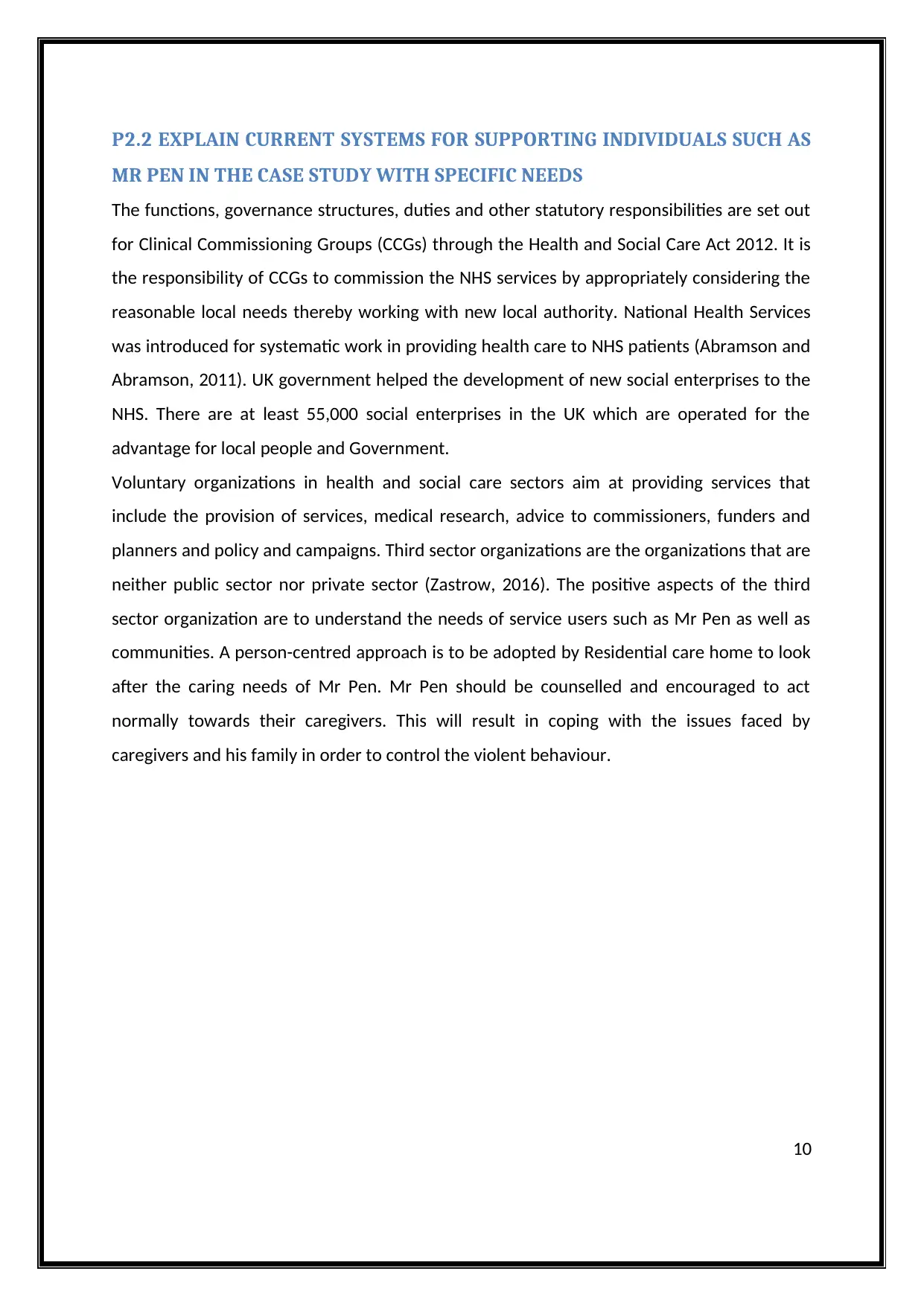
P2.2 EXPLAIN CURRENT SYSTEMS FOR SUPPORTING INDIVIDUALS SUCH AS
MR PEN IN THE CASE STUDY WITH SPECIFIC NEEDS
The functions, governance structures, duties and other statutory responsibilities are set out
for Clinical Commissioning Groups (CCGs) through the Health and Social Care Act 2012. It is
the responsibility of CCGs to commission the NHS services by appropriately considering the
reasonable local needs thereby working with new local authority. National Health Services
was introduced for systematic work in providing health care to NHS patients (Abramson and
Abramson, 2011). UK government helped the development of new social enterprises to the
NHS. There are at least 55,000 social enterprises in the UK which are operated for the
advantage for local people and Government.
Voluntary organizations in health and social care sectors aim at providing services that
include the provision of services, medical research, advice to commissioners, funders and
planners and policy and campaigns. Third sector organizations are the organizations that are
neither public sector nor private sector (Zastrow, 2016). The positive aspects of the third
sector organization are to understand the needs of service users such as Mr Pen as well as
communities. A person-centred approach is to be adopted by Residential care home to look
after the caring needs of Mr Pen. Mr Pen should be counselled and encouraged to act
normally towards their caregivers. This will result in coping with the issues faced by
caregivers and his family in order to control the violent behaviour.
10
MR PEN IN THE CASE STUDY WITH SPECIFIC NEEDS
The functions, governance structures, duties and other statutory responsibilities are set out
for Clinical Commissioning Groups (CCGs) through the Health and Social Care Act 2012. It is
the responsibility of CCGs to commission the NHS services by appropriately considering the
reasonable local needs thereby working with new local authority. National Health Services
was introduced for systematic work in providing health care to NHS patients (Abramson and
Abramson, 2011). UK government helped the development of new social enterprises to the
NHS. There are at least 55,000 social enterprises in the UK which are operated for the
advantage for local people and Government.
Voluntary organizations in health and social care sectors aim at providing services that
include the provision of services, medical research, advice to commissioners, funders and
planners and policy and campaigns. Third sector organizations are the organizations that are
neither public sector nor private sector (Zastrow, 2016). The positive aspects of the third
sector organization are to understand the needs of service users such as Mr Pen as well as
communities. A person-centred approach is to be adopted by Residential care home to look
after the caring needs of Mr Pen. Mr Pen should be counselled and encouraged to act
normally towards their caregivers. This will result in coping with the issues faced by
caregivers and his family in order to control the violent behaviour.
10
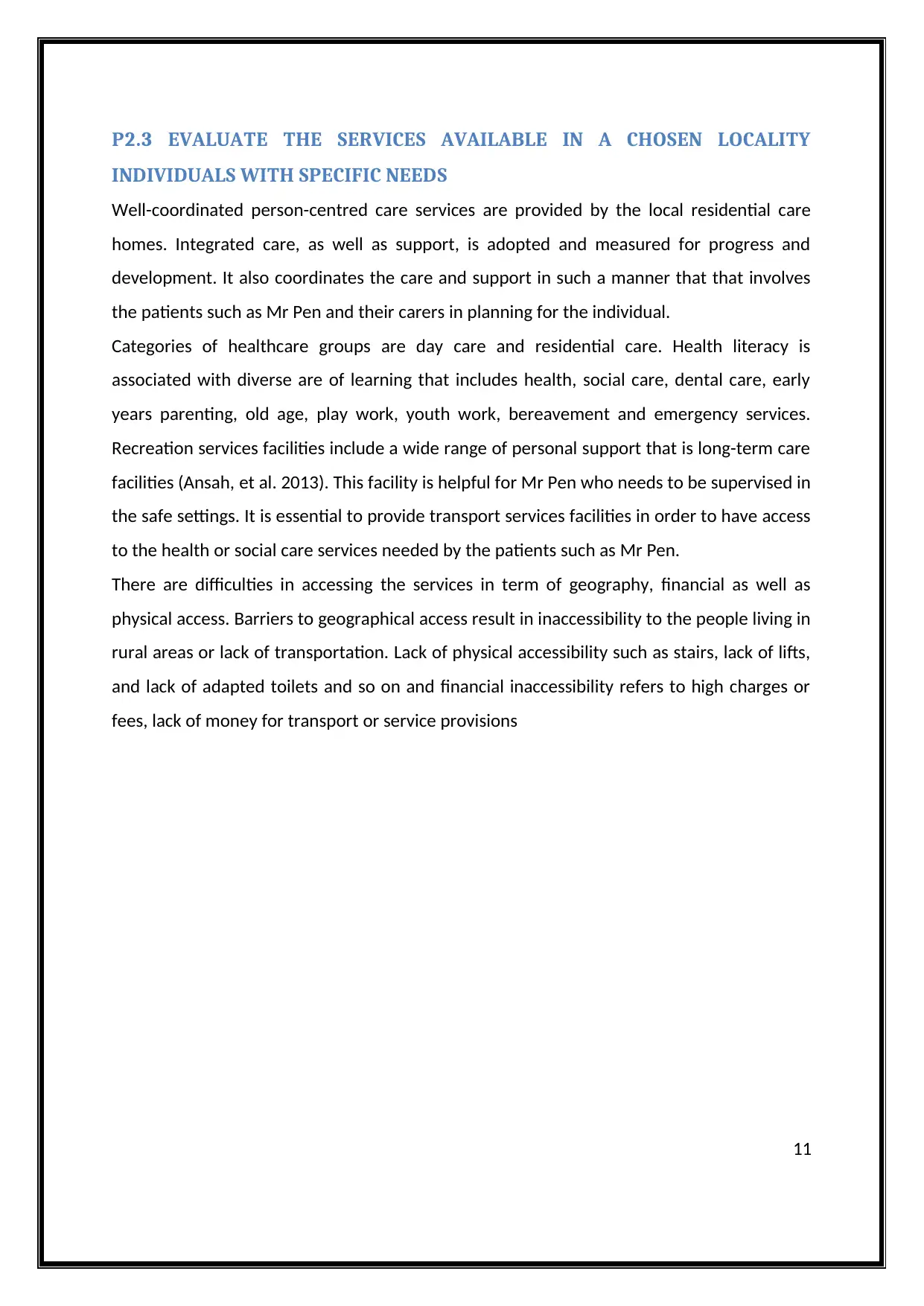
P2.3 EVALUATE THE SERVICES AVAILABLE IN A CHOSEN LOCALITY
INDIVIDUALS WITH SPECIFIC NEEDS
Well-coordinated person-centred care services are provided by the local residential care
homes. Integrated care, as well as support, is adopted and measured for progress and
development. It also coordinates the care and support in such a manner that that involves
the patients such as Mr Pen and their carers in planning for the individual.
Categories of healthcare groups are day care and residential care. Health literacy is
associated with diverse are of learning that includes health, social care, dental care, early
years parenting, old age, play work, youth work, bereavement and emergency services.
Recreation services facilities include a wide range of personal support that is long-term care
facilities (Ansah, et al. 2013). This facility is helpful for Mr Pen who needs to be supervised in
the safe settings. It is essential to provide transport services facilities in order to have access
to the health or social care services needed by the patients such as Mr Pen.
There are difficulties in accessing the services in term of geography, financial as well as
physical access. Barriers to geographical access result in inaccessibility to the people living in
rural areas or lack of transportation. Lack of physical accessibility such as stairs, lack of lifts,
and lack of adapted toilets and so on and financial inaccessibility refers to high charges or
fees, lack of money for transport or service provisions
11
INDIVIDUALS WITH SPECIFIC NEEDS
Well-coordinated person-centred care services are provided by the local residential care
homes. Integrated care, as well as support, is adopted and measured for progress and
development. It also coordinates the care and support in such a manner that that involves
the patients such as Mr Pen and their carers in planning for the individual.
Categories of healthcare groups are day care and residential care. Health literacy is
associated with diverse are of learning that includes health, social care, dental care, early
years parenting, old age, play work, youth work, bereavement and emergency services.
Recreation services facilities include a wide range of personal support that is long-term care
facilities (Ansah, et al. 2013). This facility is helpful for Mr Pen who needs to be supervised in
the safe settings. It is essential to provide transport services facilities in order to have access
to the health or social care services needed by the patients such as Mr Pen.
There are difficulties in accessing the services in term of geography, financial as well as
physical access. Barriers to geographical access result in inaccessibility to the people living in
rural areas or lack of transportation. Lack of physical accessibility such as stairs, lack of lifts,
and lack of adapted toilets and so on and financial inaccessibility refers to high charges or
fees, lack of money for transport or service provisions
11
⊘ This is a preview!⊘
Do you want full access?
Subscribe today to unlock all pages.

Trusted by 1+ million students worldwide
1 out of 22
Related Documents
Your All-in-One AI-Powered Toolkit for Academic Success.
+13062052269
info@desklib.com
Available 24*7 on WhatsApp / Email
![[object Object]](/_next/static/media/star-bottom.7253800d.svg)
Unlock your academic potential
Copyright © 2020–2026 A2Z Services. All Rights Reserved. Developed and managed by ZUCOL.




